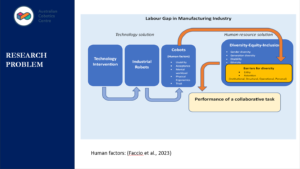Cobots Intervention for a diverse Australian manufacturing workforce
Start: February 2023
Expected end date: August 2026
As new technologies are introduced, workers must re-train, upskill and adapt as production processes and specific jobs are re-designed. Opportunities exist to diversify the workforce, retain ageing or injured workers, and create a new employee-value proposition.
With the aim of expanding the available pool of talent and addressing attraction issues, this Project will look at the implementation of collaborative robotic technology across all Partner Organisations with manufacturing operations. It will explore the potential for new technologies to provide jobs that might be attractive to younger applicants and previously under-represented groups of workers in manufacturing, such as women or people with a disability.
Further, the study will consider how such technology might address retention and knowledge management issues by enabling injured or ageing workers to remain in meaningful and secure employment.
Summary Update – August 2023
Accelerated global mobility and the growth of migration and transnationalism have increased diversity in the Australian community (Young et al., 2018). Furthermore, women’s employment is growing nine times faster than that of men, even as the workforce is getting older (2% to be over 65 years by 2057) (Catalyst, 2022). Turban et al. (2019) stated that management of diversity could attract both new talents and new investments, demonstrating the importance of a diversified workforce as a labour strategy.
At the same time, Industry 4.0 is leading to significant technological change in manufacturing in Australia. Industry 4.0 involves the introduction of broader range of artificial intelligence (AI), robotics, and machine learning technologies, which have significantly changed the fundamentals of work environment. One such technology is the “collaborative robot”, commonly known as Cobots, which allows robots and humans to work together, collaboratively in the same space (Nyikes, 2022). Cobotics is today viewed as an effective industrial solution to perform complicated and time-consuming tasks in a safe, flexible, and effective way (Mouad Bounouar, 2022).
As such, Cobots reduce the physical demand and specific skills to perform manufacturing jobs and it would provide more opportunities and more attraction for underrepresented groups such as women, disabled and aged work groups to enter to manufacturing sector. Thus, this study to review existing knowledge on equity, diversity, and inclusion (EDI) (concepts, categories, benefits, and potential obstacles) and explore the significance of Cobots as a potential solution for employee diversity.

Expected Outcomes
Upon completing this research, we expect to develop:
* TBC
* TBC
Supervisory Team
- Principal Supervisor: Associate Professor Penny Williams, QUT
- Associate Supervisor: Professor Greg Hearn and Dr Melinda Laundon
Publications
First Author
- Hettiarachchi, A. Potential of Cobots intervention on Australian manufacturing workforce diversity: A conceptual paper, Australian and New Zealand Academy of Management (ANZAM) 2024 Conference, University of Woolongong 2 December 2024
Associated Researchers